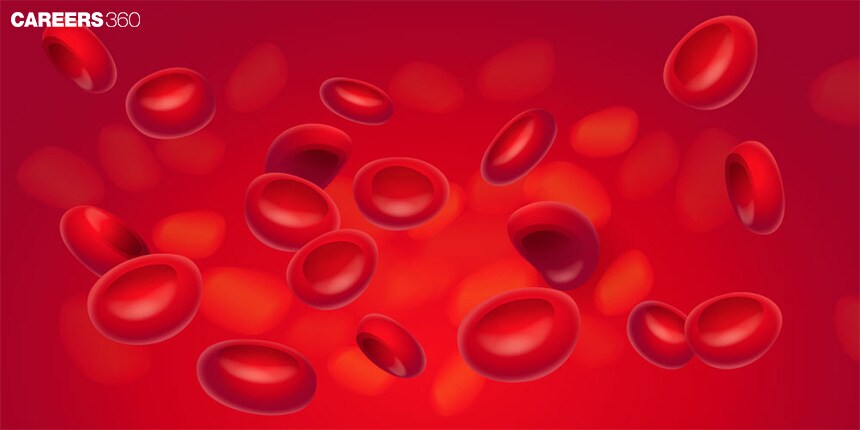Facts about Blood
Blood is a vital fluid in the human body that transports oxygen, nutrients, hormones, and waste products. It is composed of plasma, red blood cells, white blood cells, and platelets. Blood accounts for about 7-8% of body weight and plays a crucial role in immunity and regulation of body temperature. In this article, blood, the composition of blood, functions of blood, and interesting facts about blood are discussed. Blood is a topic of the chapter Body Fluids and Circulation in Biology.
NEET 2025: Mock Test Series | Syllabus | High Scoring Topics | PYQs
NEET Important PYQ's Subject wise: Physics | Chemistry | Biology
New: Meet Careers360 B.Tech/NEET Experts in your City | Book your Seat now
- What Is Blood?
- Composition of Blood
- Blood Functions
- Interesting Facts about Blood

What Is Blood?
Blood is one of the most important fluids in a human being's body. Blood transports oxygen and nutrition to the cells of the body and the removal of waste products from them. It further performs the function of maintaining homeostasis, protecting against diseases, and rendering service to the total organs of the body.
Knowing the composition of blood, functions, and related disorders is quite important in medical and biological studies. It helps diagnose and treat various health conditions, and hence the study is always ongoing for a healthcare professional.
Composition of Blood
Blood is composed of different constituents that play different functions.
These are as follows:
Plasma
Description: Liquid portion of blood
Functions: Transfers nutrients, hormones, waste products
Composition: 90% water, 10% proteins, electrolytes, nutrients
Red Blood Cells (Erythrocytes)
Structure: Biconcave discs without nuclei
Role: Transport of oxygen via haemoglobin
Lifecycle: Formed in the bone marrow; living for approximately 120 days.
White Blood Cells (Leukocytes)
Types: Neutrophils, lymphocytes, monocytes, eosinophils, basophils
Role: Fight infections and other foreign invaders
Disorders: Leukemia, Lymphoma
Platelets (Thrombocytes)
Structure: Small pieces of cells
Function: Blood coagulation to avoid loss of blood from the body.
Also Read-
Blood Functions
Blood performs many vital functions in the human body:
Transport
Oxygen and carbon dioxide between the lungs and tissues.
Nutrients from the digestive system to cells.
Hormones and enzymes all over the body.
Regulation
pH Balance for proper functioning of the body.
Temperature of body
Fluid balance
Protection
Immune protection through leucocytes
Blood clotting by thrombocytes.
Interesting Facts about Blood
Some interesting facts about blood are listed below-
Fact No. 1
The only liquid connective tissue that circulates throughout the body is blood. All essential elements, including proteins, glucose hormones, oxygen, minerals, electrolytes, and other waste products from metabolism, are also transported by it.
Fact No. 2
Approximately 7–8% of the body weight is made up of blood. The two primary components of blood are plasma and formed elements, or corpuscles, which include blood platelets, red blood cells, and white blood cells, or WBCs.
Fact No. 3
Transportation, defence against external invasion, and control of body temperature and pH are among the main roles of blood.
Fact No. 4
Humans have red blood, although the respiratory pigment, or haemoglobin, is primarily responsible for the varied blood hues of other species.
Fact No. 5
Red blood cells, also known as erythrocytes, white blood cells, also known as leukocytes, blood platelets, also known as thrombocytes, and plasma, which is made up of protein, ions, and water, make up the majority of blood.
Fact No. 6
White blood cells, or leukocytes, are vital to the human reproductive system because they support a robust immune system and help the ovary's blood artery network grow.
Fact No. 7
About 1.325 gallons of blood make up an adult, healthy human body. Millions of red blood cells, thousands of white blood cells, and lakhs of blood platelets are all present in a single drop of blood.
Fact No. 8
Blood group is inherited genetically from our parents, just like other body traits like the eye, skin colour, and hair texture. The ABO blood type system refers to the four primary blood groups of humans: O, A, B, and AB.
Fact No. 9
The hereditary antigenic materials on the surface of red blood cells serve as the primary basis for differentiating these blood groups.
Fact No. 10
Research indicates that the ABO blood type system influences a person's fertility, personality, stress levels, and other aspects of their life, as well as resulting in different nutritional needs.
Also Read-
| Coronary Circulation | Facts about Blood Group |
| Types of Blood Cells | Blood coagulation |
| ABO Blood Group | Circulatory System |
Recommended Video for Facts About Blood
Frequently Asked Questions (FAQs)
Blood carries oxygen, nutrients, and waste products; it regulates pH and temperature; it protects from infections and bleeding.
The blood type should match perfectly to avoid some negative reactions during transfusions.
The symptoms of anaemia include becoming tired and short of breath; the causes are low iron levels within the body and genetic problems.
It is a blood test that measures RBC count, WBC count, haemoglobin, hematocrit, and platelets.
Research focuses on developing artificial blood substitutes for emergencies and the treatment of various blood disorders.
Also Read
29 Nov'24 01:19 PM
27 Nov'24 07:39 PM
27 Nov'24 07:15 PM
27 Nov'24 05:11 PM
26 Nov'24 08:14 PM
26 Nov'24 06:50 PM
26 Nov'24 05:51 PM
26 Nov'24 04:44 PM
26 Nov'24 03:52 PM
26 Nov'24 02:55 PM